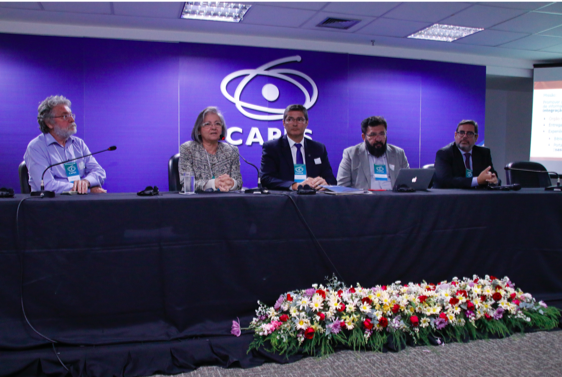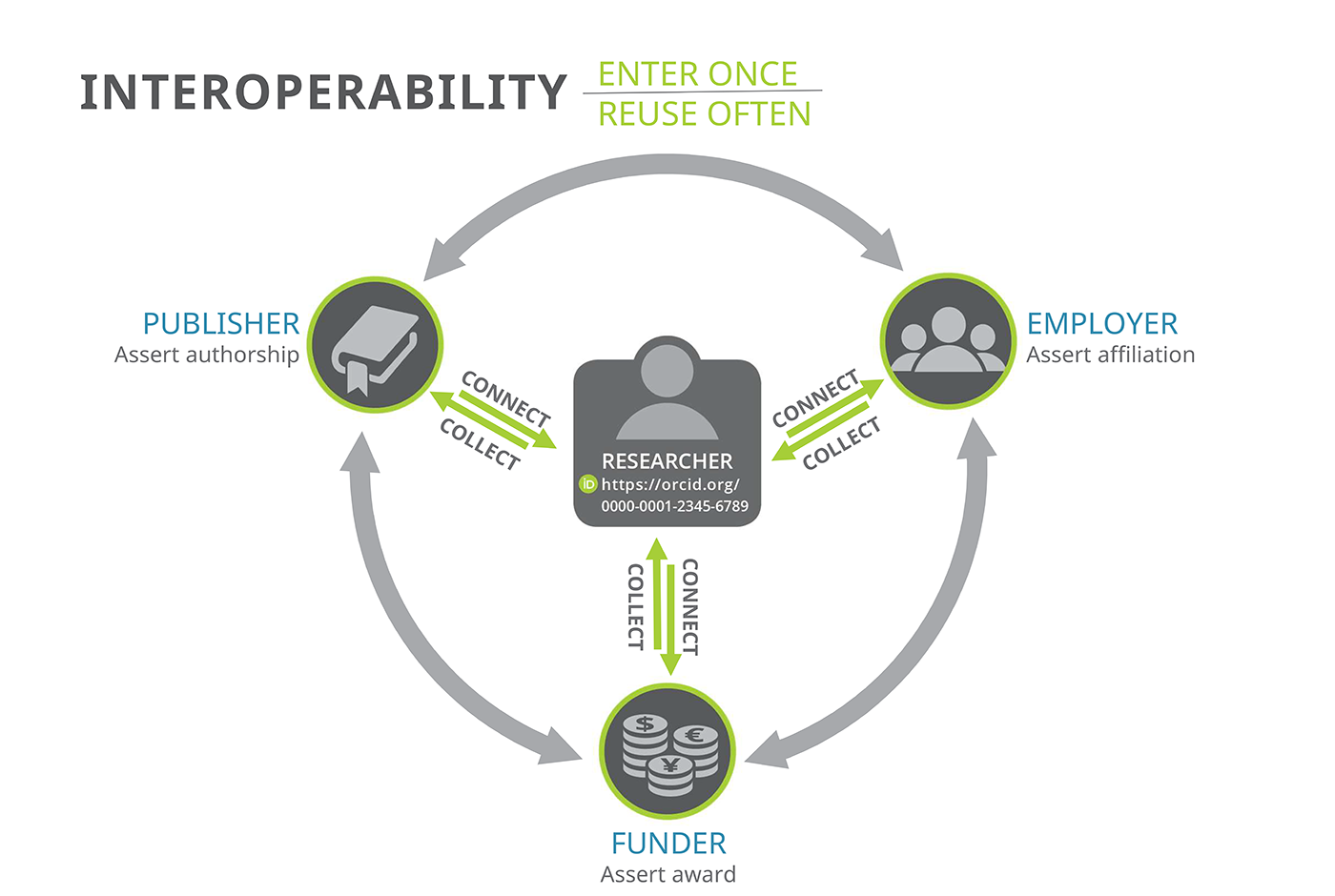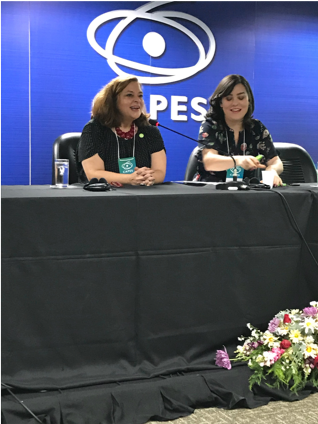This post was co-authored with Laure Haak, ORCID’s Executive Director
 Brazilian research is becoming more visible internationally. The number of articles published has increased substantially, with an average growth of 10.7 % per year, a rate five times higher than the world average, moving the country into the top 15 in terms of research productivity. Much of this growth can be traced to progressive government policies and programs that support both research projects and the information infrastructure needed for collaboration and dissemination of results.
Brazilian research is becoming more visible internationally. The number of articles published has increased substantially, with an average growth of 10.7 % per year, a rate five times higher than the world average, moving the country into the top 15 in terms of research productivity. Much of this growth can be traced to progressive government policies and programs that support both research projects and the information infrastructure needed for collaboration and dissemination of results.
In this post, we describe the launch of the ORCID Brazil consortium in the context of Brazilian leadership in open research.
- ORCID Brazil Consortium
- Key Brazilian initiatives
- Technology infrastructure
- International scope
- What is next?
- Additional information
ORCID Brazil Consortium
Among the organizations responsible for supporting the growth of Brazilian research and its international visibility are several of the founder members of the ORCID Brazil consortium as well as the consortium lead organization (RNP). The Brazil consortium officially launched in May, at an event hosted by CAPES. Slides from the launch event are available on the CAPES page.
- CAPES (Coordination of Improvement of Higher Education Personnel) – a funding agency under the Ministry of Education and plays a fundamental role in the evaluation of stricto sensu (master’s and doctorate) postgraduate courses. CAPES also invests in the formation of high-level resources in the country and abroad, as well as the promotion of international scientific cooperation.
- CNPq (National Council for Scientific and Technological Development) – a funding agency under the Ministry of Science, Technology, Innovation and Communication. It manages the national Lattes Platform, which integrates CV, Research Groups and Institutions databases in a unique information system. The Lattes Platform comprises over 3.5M curriculum vitae as it is mandatory for all researchers applying for a grant at the national and regional funding agencies.
- CONFAP (Brazilian National Council for the State Funding Agencies) – a non-profit organization articulating the interests of the twenty-six Brazilian state funding agencies.
- IBICT (Brazilian Institute Science and Technology Information) – an organization under the Ministry of Science, Technology, Innovation and Communication, responsible for providing curated, organized and validated information on science and technology at the national level. IBICT promotes the development of resources and infrastructure for the production, share and integration of scientific and technological knowledge, and has two experiences on systems interoperability: the Brazilian Digital Library of Theses and Dissertations and the Brazilian Portal of Scientific Open Access Publications.
- SciELO (Scientific Electronic Library Online) – a bibliographic database, digital library, and cooperative electronic publishing model of open access journals. SciELO Brasil currently indexes 289 scientific journals across all research areas.
- RNP (National Research and Educational Network) – the consortium lead organization. RNP’s primary responsibility is to promote technological development, creating innovative services and projects and training professionals by providing advanced network infrastructure that facilitates collaborative research. RNP is linked to the Ministry of Science, Technology, Innovations and Communications and maintained by them, together with the Ministries of Education, Culture, Health, and Defense.
Key Brazilian initiatives
The organizations in the ORCID consortium are all leading key research information initiatives, including:
- SciELO and Capes Portal de Periódicos Platforms. For the last 15 years, the Brazilian research community has been provided access to the best scientific information available in the world, in the most wide and open way. In a country with continental dimensions and big inequalities, this wide access to full-text is key to the production of high-quality research.
- CNPq Lattes Platform. This was the first national researcher profile system, upon which many others have been modelled internationally. Having a profile in this platform is mandatory for each researcher applying for a CNPq grant, making this database extremely complete and an effective collaboration and evaluation tool.
- CAPES Sucupira Platform. The Post-Graduation Programs play a central role in the production of high-quality research in Brazil. CAPES evaluates these Programs every three years through a very complete system of evaluation, including the Sucupira tool, which receives input from the individual researcher’s Lattes CV.
- CAPES Qualis Evaluation and SciELO Guidelines. These two initiatives aim at improving the quality of Brazilian research journals, through guiding editors in implementing best practices and professionalizing processes, according to international standards and ethics in scientific publishing. They also support the evaluation and indexing of research journals.
- CAPES Science Without Borders Program. Researcher mobility and collaboration is a key factor of the research produced in every country. This CAPES Program increased the visibility of Brazilian science in recent years. Not only did Brazilian scientists travel to other countries because of this Program, but Brazil also became more attractive for foreign researchers; the results of these collaborations are to be seen in the next years’ co-authored publications.
- RNP CAFe. Researchers are educated and trained at academic institutions. CAFe provides a national identity management system for education and research institutions, so that researchers can access the services of their institution and other participating organizations from wherever they are. Distance learning services, access to scientific publications and collaborative activities are among the biggest beneficiaries of the infrastructure offered by federations.
Technology infrastructure
Underlying these policies and programs is a technology infrastructure that supports sharing of information between systems. CAFe is one very clear example of this infrastructure, allowing users to access information across multiple university and research institute sites with a single username and password. Another example is the use of Digital Object Identifiers (DOIs) in the SciELO publishing platform, which allows easy resolution of the journal article while also supporting persistence of the document. More recently, Brazilian researchers have also been adopting the use of ORCID. Over 100,000 Brazilian researchers have registered for an ORCID iD, and the country enjoys the sixth highest usage of the ORCID Registry, globally.
International scope
Those same organizations that have supported the emergence of Brazilian research on the global stage, again have the opportunity to play a leadership role in open research, this time by leveraging ORCID across national research information infrastructures. It is now possible for researchers to pair their ORCID iD with their CAFe login credentials. Unesp, Unicamp, and USP have started projects to integrate ORCID into their directory systems – steps toward enabling these universities to share employment affiliation information that researchers can use when submitting a paper or grant. SciELO have started to collect ORCID iDs for authors using their publishing platform, and more than 60 Brazilian journals are requiring ORCID iDs from authors submitting papers through SciELO. CNPq is assessing how to use ORCID in its Lattes CV system; and CAPES is considering how to use ORCID, including use in its international programs.
Integrating ORCID into key Brazilian publishing, funding, and employer systems, will support national-scale open research objectives. A national approach to ORCID provides another opportunity for Brazil to lead on the world stage, extending national ORCID adoption across sectors of the research community from one that has to date largely involved research universities. A coordinated cross-sector approach would enable interoperability and data sharing across research information systems, improving discoverability on a national scale, improving data quality and reducing the burden on researchers and administrators alike for managing CVs and reporting research outcomes.

In this scenario, Brazilian researchers will be able to share their iD with their home organization (via CAFe), and receive in return an electronic statement of affiliation with that organization (via the organization directory), along with the organization’s name and identifier (OID). Researchers may use that information (person/ORCID + affiliation/OID) when submitting a paper (via SciELO or many other publishing platforms); and when the paper is published receive an electronic statement of authorship (person/ORCID + paper/DOI + publisher/OID), which can be easily shared with the researcher’s home institution or funder via an API. Similarly, the researcher can share their electronic information when they submit a grant (via CNPq/CAPES), and when the grant is awarded receive an electronic statement of award (person/ORCID + grant/DOI + funder/OID) Because the connections are made as a researcher interacts with trusted research information systems, it both imbues verification into the connection and reduces the work needed for researchers to manage their information. All the while, researchers control when they use their ORCID iD and with whom they share their information.
What is next?
Following the launch of the ORCID Brazil consortium, we look forward to working with the Brazilian research community to help make this vision a reality. Part of this effort will be to ensure community needs are  understood, and that ORCID services are used following best practices. Some organizations – including Unesp, Unicamp, USP, Fiocruz, and SciELO have already begun. And there is clear support from all sectors for increasing the adoption and use of ORCID in Brazil, as shown in these comments from attendees at the launch:
understood, and that ORCID services are used following best practices. Some organizations – including Unesp, Unicamp, USP, Fiocruz, and SciELO have already begun. And there is clear support from all sectors for increasing the adoption and use of ORCID in Brazil, as shown in these comments from attendees at the launch:
“Our goal is to change the reality of replication of information, and to have systems operating in an integrated way, using standard identifiers, reducing manual input and improving data quality. With regard to CAPES, the adoption of ORCID in information systems will be an important gain in agility and quality. We intend this to happen mainly in the Sucupira Platform, which records data from postgraduate programs, in grant systems, and in international project bidding systems. However, this does not represent the entire ‘ecosystem’ of research information. We believe that the participation of other actors who hold information relevant to the completeness of the research universe in Brazil is fundamental. Therefore, the proposal of the consortium.” Talita Moreira, General Coordinator of Post-Graduate Activities, Evaluation Office, Coordenação de Aperfeiçoamento de Pessoal de Nível Superior, CAPES
“In my opinion, Brazil urgently needs to create mechanisms of greater and better connection with the world through the process of internationalization of its higher education. The easiest means of doing so is through database interoperability. ORCID is one of the most important instruments in this sense.” Geraldo Nunes Sobrinho, Director of Programs and Scholarships, Coordenação de Aperfeiçoamento de Pessoal de Nível Superior, CAPES
“The event represented an opportunity to strengthen the consortium of national agencies, aiming at increasing research information database interoperability. The use of ORCID, in this sense, is both a challenge and a catalyst.” José Ricardo de Santana, Director of Institutional Cooperation, Conselho Nacional de Desenvolvimento Científico e Tecnológico, CNPq
“The adoption of ORCID by Brazilian researchers will contribute to greater control and visibility of research and to quality control for journals. This would be a gain for researchers, institutions and for Brazil as a whole.” Abel Packer, Director of Scientific Library Online, SciELO Brasil
“The ORCID initiative, through a consortium approach of the main Brazilian agencies for education, research and technological development, highlights the way in which research information must be addressed, through ethical management of access and by avoiding data re-entry when filling huge forms. We believe that the Brazilian Association of Scientific Editors (ABEC) has a duty to help build this way of handling information in our century. ORCID comes to give us this guarantee of global interoperability coupled with the security of this data.” Rui Seabra, President of Brazilian Scientific Editors Association – ABEC
“The ORCID Brazilian Consortium, besides giving international visibility to research, promises to affect the interoperability of academic and scientific information systems, an initiative so awaited by Brazilian researchers.” Elisabeth Adriana Dudziak, Sistema Integrado de Bibliotecas – DT/SIBi, Universidade de São Paulo, USP
“The ORCID Consortium event was a success, especially for information professionals. The Consortium will be a gain for Brazilian research!” Fabiana de Oliveira Silva, Director of Library Systems, Universidade Federal de Uberlândia, UFU
“The Brazilian ORCID Consortium is a very significant strategy for the actions of CONFAP, together with our partners. Now, we are looking forward to consolidating the integration of our national systems of science and technology with ORCID, providing more visibility to Brazilian science in the global scenario.” Maria Zaira Turchi, President of CONFAP
Additional information:
- SciELO interview with Laure Haak, ORCID Executive Director
- The ORCID Brazilian Consortium: Building a Community
- Consórcio brasileiro ORCID: Construindo uma comunidade
Photos:
- Key Brazilian science agents are funder members of the consortium and participated in the event: CAPES, CNPq, IBICT, CONFAP, SCIELO and RNP (Photo: Haydée Vieira – CCS/CAPES)
- Ana Heredia and Talita Moreira, from ORCID and CAPES, respectively (Photo: Laure Haak – ORCID)
